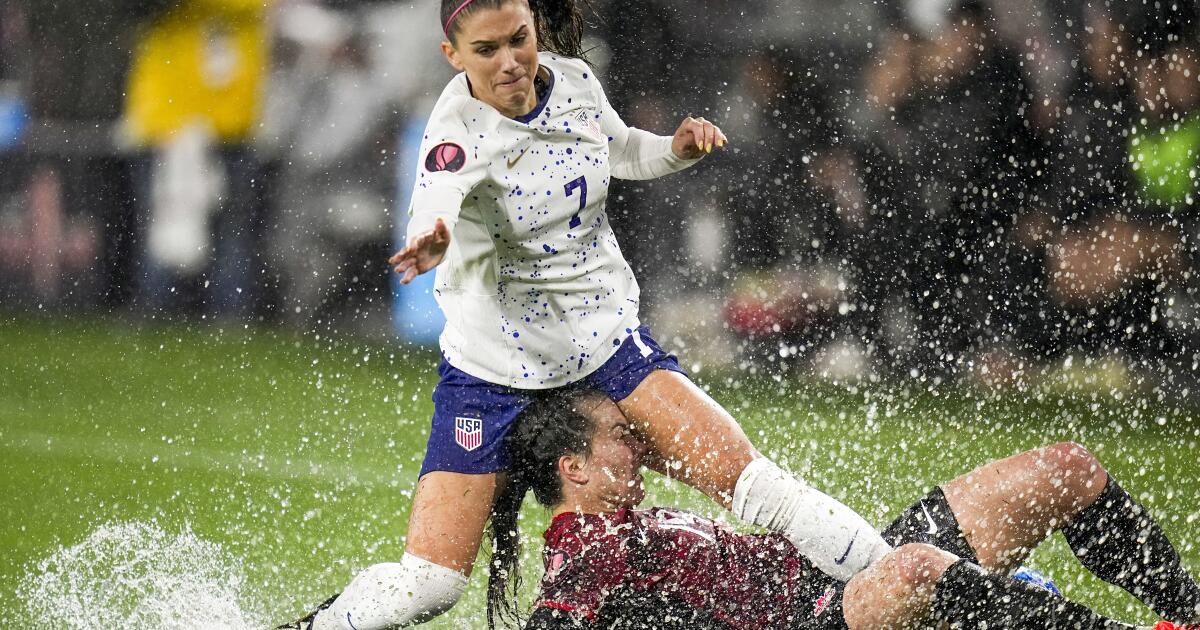When they returned to start the game 15 minutes later, the drizzle had become a deluge and the field was under water. Lots and lots of water.
“It’s obvious that the game was unplayable,” Canadian coach Bev Priestman said.
That was the consensus opinion of everybody not on the officiating crew headed by Mexican referee Katia García. She told the teams to get on with it and the result may have been the most memorable game that never should have been played.
It was a soggy battle that saw the U.S. twice give away one-goal leads — the second on a penalty kick deep in stoppage time — in a 2-2 draw that was settled in a penalty-kick shootout the Americans won to advance to Sunday’s tournament final with Brazil.
The hero was U.S. keeper Alyssa Naeher, who committed the foul that led to the game-tying score, then saved three penalties while making one of her own in the shootout.
Yet it never should have happened.
“The first 10, 15 minutes, we kept looking at the fourth referee to see if they were going to call it or not,” U.S. forward Sophia Smith said. “They didn’t.”
“Both teams were talking to each other on the field thinking ‘there’s no way this game is going to continue,’” added striker Alex Morgan. “The ref just continued to let play go.”
A flood watch was in effect when the game kicked off on a sodden field drenched with so much standing water, players hydroplaned after well-struck passes that stopped suddenly in the puddles. At one point U.S. captain Lindsey Horan tried to make a pass near midfield only to see her right foot raise a tremendous splash while the ball barely moved.
“The ball was doing crazy stuff today,” Morgan said.
Whatever game the teams thought they were playing, it wasn’t soccer: Neither team completed more than 42% of its passes and together they combined for just 15 shots. The beautiful game drowned in the quagmire.
Naomi Girma’s first reaction was to giggle.
“I have not experienced anything like that,” she said. “After the first five minutes, I wasn’t sure if we were going to keep playing. The ball’s not moving. There were so many puddles.
“It was not safe.”
And with a spot in the confederation’s title game at stake, both teams — as well as the sport — deserved better. Yet CONCACAF put the blame on García, saying “it is solely at the discretion of the referee as to whether the field is safe and playable.”
García, however, was seen conferring with people on the sidelines, so at best it was a joint decision. Either way, the game continued.
“We had a game plan, they had a game plan,” interim U.S. coach Twila Kilgore said. “That pretty much goes out the window in the first minute.”
The weather conditions led to the game’s first goal when a routine back pass from Canadian defender Vanessa Giles simply stopped in the mud, allowing U.S. attacker Jaedyn Shaw to race around Giles and put a shot past keeper Kailen Sheridan, her club teammate with the San Diego Wave.
The goal, in the 20th minute, made Shaw the first player in USWNT history to score in each of her first four starts. The puddle should have been given an assist.
That was the only goal of the first half and the break gave the grounds crew a chance to shovel water off the field. The rain also began to let up as the night wore on, making the second half less treacherous.
But not less exciting.
The Americans were eight minutes away from escaping with the win when Canada’s Jordyn Huitema — at 5-foot-11, the tallest player on her team — went high to head in an Ashley Lawrence cross for the game-tying goal, sending the game to extra time.
The U.S. went ahead again in the first overtime period when Smith, taking advantage of another poor decision from Giles, ran on to a header from Rose Lavelle before beating Sheridan cleanly.
But Canada rallied again to tie the score, this time on a penalty kick seven minutes into stoppage time after Naeher was called for the foul after colliding with Giles in front of the goal.
García appeared ready to let play continue before she was urged to consult a video replay. That led her to award a penalty that Canada’s Adriana Leon converted for her tournament-best sixth goal, deflating a U.S. team that had the game won twice.
“It’s really hard in that moment to regroup mentally, emotionally and just come together,” Naeher said. “[But] there was never a moment of ‘sorry us.’”
Especially not for Naeher, who guessed right on three of Canada’s four tries in the four-round penalty shootout. When she came out of the locker room, the tote bag slung over her right shoulder contained the game ball.
“I think someone grabbed it for me,” she said with a smile.
For Kilgore, meanwhile, what Wednesday’s performance lacked in form and finesse was more than made up for by her team’s heart and resiliency.
“The game is played under all sorts of conditions all over the world. And today, our conditions happen to be a ton of rain, and standing water on the field,” she said. “You’ve got to find a way to get it done. And it takes a certain mentality to do that.
“These moments are actually really critical to building towards major events. Sometimes it just, it takes a grind, it takes a mentality. And we did that today.”
In the first semifinal, played on a relatively dry field, Brazil won its spot in Sunday’s final by handing Mexico its first loss in 24 games under coach Pedro López. The goals in the 3-0 win came from Adriana Leal, Antonia and Yasmim.
“I’m really excited to play them,” Horan said afterward. “But I’m also excited to play a game of football.”
